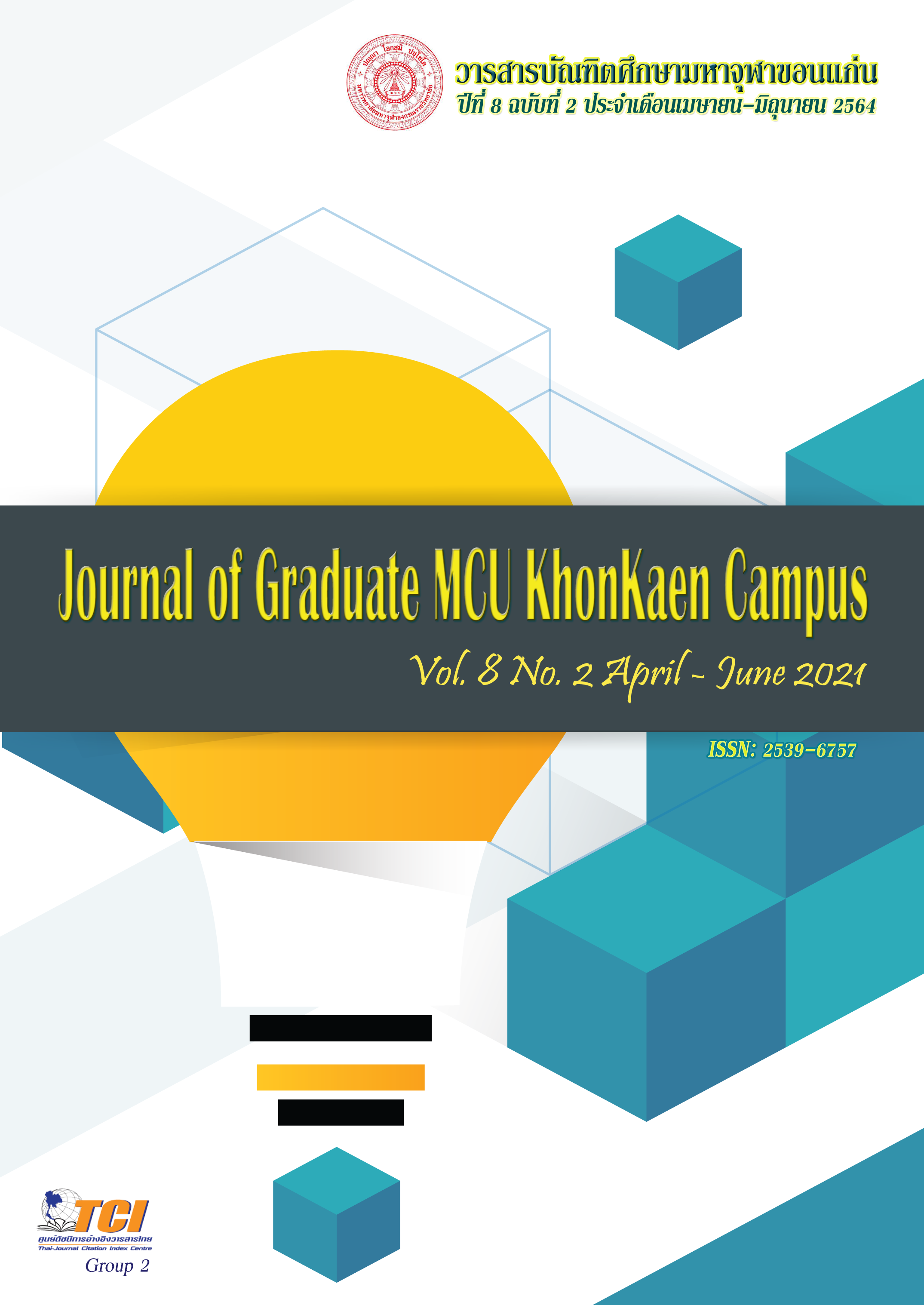การวิเคราะห์หลักอัตถิภาวนิยมในพระพุทธศาสนา
Main Article Content
บทคัดย่อ
งานวิจัยนี้มีวัตถุประสงค์ 1) เพื่อศึกษาหลักอัตถิภาวนิยมในพระพุทธศาสนา 2) เพื่อศึกษาทฤษฎีอัตถิภาวนิยม 3) เพื่อวิเคราะห์หลักอัตถิภาวนิยมในพระพุทธศาสนา เป็นการวิจัยเชิงเอกสาร ศึกษาข้อมูลจากพระไตรปิฎก เอกสารวิชาการ และงานวิจัยที่เกี่ยวข้อง วิเคราะห์ข้อมูลเชิงพรรณนาตามหลักอุปนัยวิธี
ผลการวิจัยพบว่า
- หลักอัตถิภาวนิยมในพระพุทธศาสนา พบว่า เสรีภาพ เป็นคำที่นำมาใช้เรียกผู้ไม่ยึดมั่นถือมั่นในขันธ์ 5 และเสรีภาพนี้ไม่ได้เกิดขึ้นมาพร้อมกับการเกิดของมนุษย์เพราะเสรีภาพนี้จะได้ด้วยการฝึกฝน อบรม ขัดเกลาตัวเองด้วยศีลธรรมอย่างเคร่งครัด จนจิตหลุดพ้นจากอวิชชา ตัณหา อุปาทาน จนจิตบรรลุโลกุตตรธรรม เพราะความไม่มีกิเลสครอบงำจิตใจ จึงได้ชื่อว่า จิตมีเสรีภาพที่แท้จริง และความเสรีภาพนี้รับรู้ได้ด้วยตนเองด้วยการปฏิบัติตามหลักคำสอนทางพุทธศาสนาอย่างถูกต้อง
- ทฤษฎีอัตถิภาวนิยม พบว่า เสรีภาพเป็นสภาวะของจิตที่มีอิสระ สามารถทำการต่างๆ ได้ตามปรารถนา ไม่มีอุปสรรคใดๆ มาขัดขวางการกระทำของตน โดยถือว่า มนุษย์ถูกสาปให้มีเสรีภาพ และเกิดมาพร้อมกับเสรีภาพ เสรีภาพจึงเป็นแก่นแท้ของชีวิตมนุษย์
เมื่อมนุษย์มีเสรีภาพ เขาจึงเลือกใช้เสรีภาพของเขาโดยไม่ให้ไปกระทบต่อเสรีภาพของคนอื่น - การวิเคราะห์หลักอัตถิภาวนิยมในพระพุทธศาสนา พบว่า การนำแนวคิดอัตถิภาวนิยม ที่มีอยู่ในหลักคำสอนของพระพุทธศาสนามาเป็นกระบวนการพัฒนามนุษย์ให้เข้าถึงเป้าหมายที่แท้จริงในระดับโลกิยะคือการกระทำของตนให้ตั้งอยู่ในกุศลธรรม และระดับโลกุตตระด้วยการละสังโยชน์ได้ ซึ่งมีขั้นตอนการเข้าถึงเสรีภาพคือ การรักษาศีล เจริญสมาธิจนได้ฌาน แล้วยกจิตขึ้นสู่วิปัสสนาด้วยการพิจารณาเห็นไตรลักษณ์ และละสังโยชน์เครื่องผูกสัตว์ไว้ในสังสารวัฏ และการจะมีเสรีภาพมาก หรือน้อยขึ้นอยู่กับการละสังโยชน์ได้ ถ้าละได้ทั้ง 10 ข้อ ก็จะบรรลุนิพพานที่ถือเป็นเสรีภาพขั้นสูงสุดในพระพุทธศาสนา
Article Details
เอกสารอ้างอิง
กีรติ บุญเจือ. (2522). ปรัชญาลัทธิอัตถิภาวนิยม. ไทยพัฒนาพานิช. จุฬาลงกรณมหาวิทยาลัย
น.ชญานุตม์. (2523). อิสรภาพ : รวมทัศนะทางปรัชญาของ นักคิด นักเขียน และนักปฏิวัติ. กรุงเทพมหานคร: สำนักพิมพ์ดวงกมล.
ประยงค์ แสนบุราณ. (2559). พระพุทธศาสนากับนานาลัทธิและปรัชญาศึกษาแนวเปรียบเทียบ. คณะมนุษยศาสตร์และสังคมศาสตร์: มหาวิทยาลัยขอนแก่น.
พระธรรมโกศาจารย์ (ประยูร ธมฺมจิตฺโต). (2551). เปรียบเทียบแนวคิดพุทธทาสกับซาร์ตร์. (พิมพ์ครั้งที่ 6). กรุงเทพมหานคร: สานักพิมพ์สุขภาพใจ.
พระเมธีธรรมาภรณ์ (ประยูร ธมฺมจิตฺโต). (2536). เปรียบเทียบพุทธทาสกับซาร์ตร์. กรุงเทพมหานคร: สำนักพิมพ์ศยาม.
พระมหายงยุทธ กนฺตาโภ (เสริมจันทร์). (2562). วิเคราะห์อัตถิภาวนิยมในพุทธปรัชญาเถรวาท. ใน ดุษฎีนิพนธ์พุทธศาสตรดุษฎีบัณฑิต สาขาวิชาปรัชญา, บัณฑิตวิทยาลัย: มหาวิทยาลัยมหาจุฬาลงกรณราชวิทยาลัย.
พระสำเริง ญาณวีโร (สุขภาพ). (2552). ศึกษาวิเคราะห์ขอบเขตของเสรีภาพในพุทธปรัชญาเถรวาทและปรัชญาของฌอง-ปอล ซาร์ต. ใน วิทยานิพนธ์พุทธศาสตรมหาบัณฑิต (สาขาวิชาปรัชญา), มหาวิทยาลัยมหาจุฬาลงกรณราชวิทยาลัย.
มหาวิทยาลัยมหาจุฬาลงกรณราชวิทยาลัย. (2539). พระไตรปิฎกฉบับภาษาไทย.
วิทย์ วิศทเวทย์. (2553). ปรัชญาทรรศน์ : พุทธปรัชญา. กรุงเทพมหานคร: จุฬาลงกรณ์มหาวิทยาลัย.

